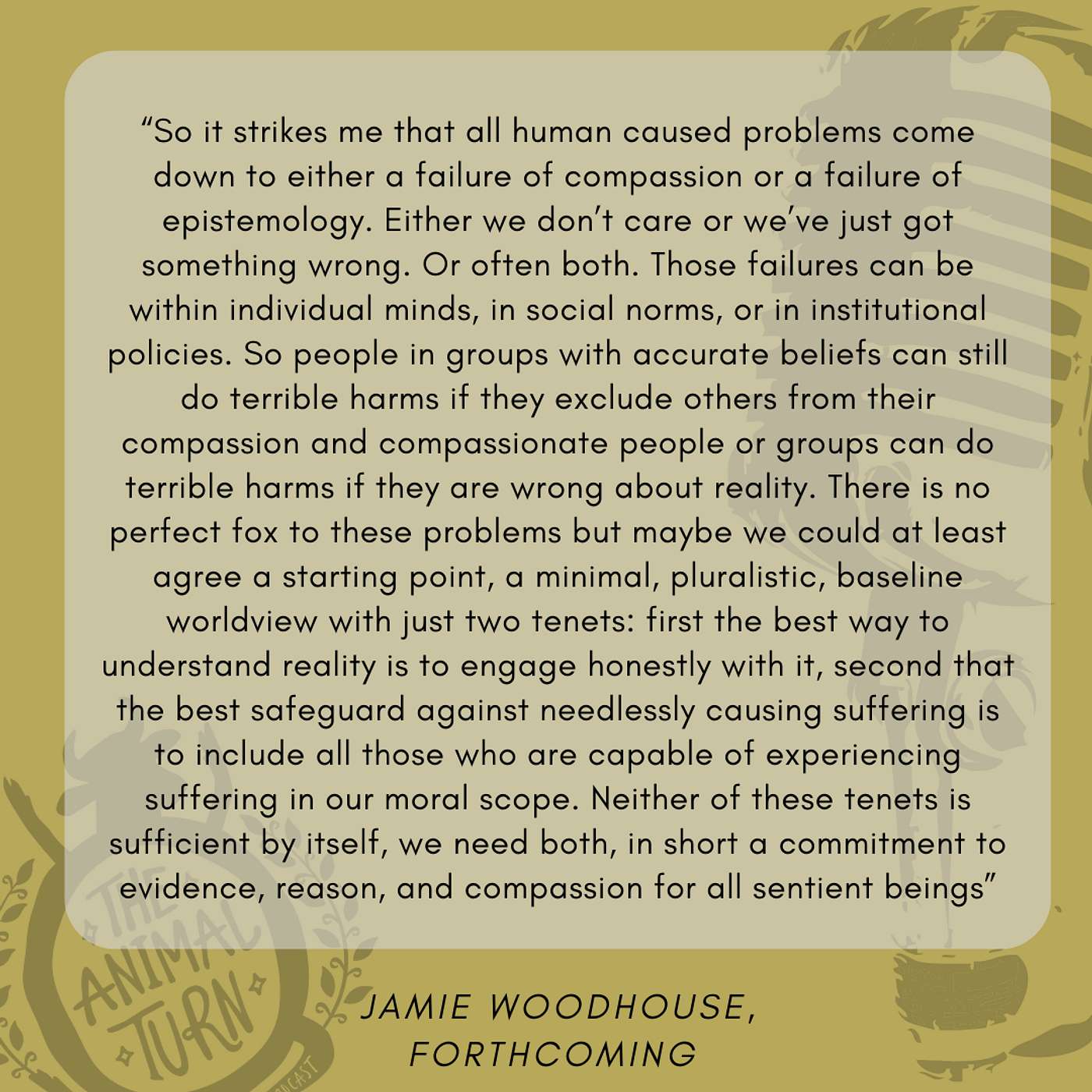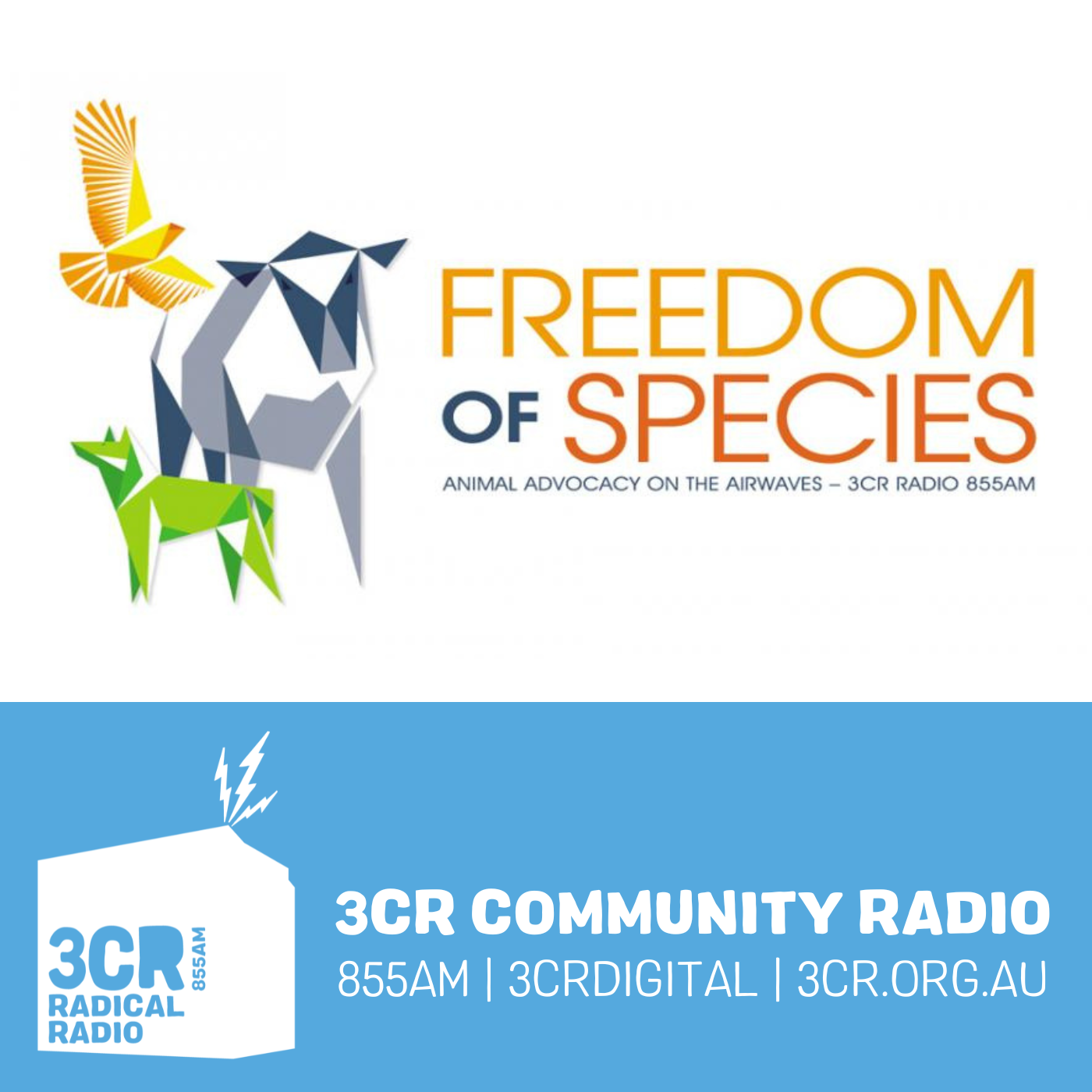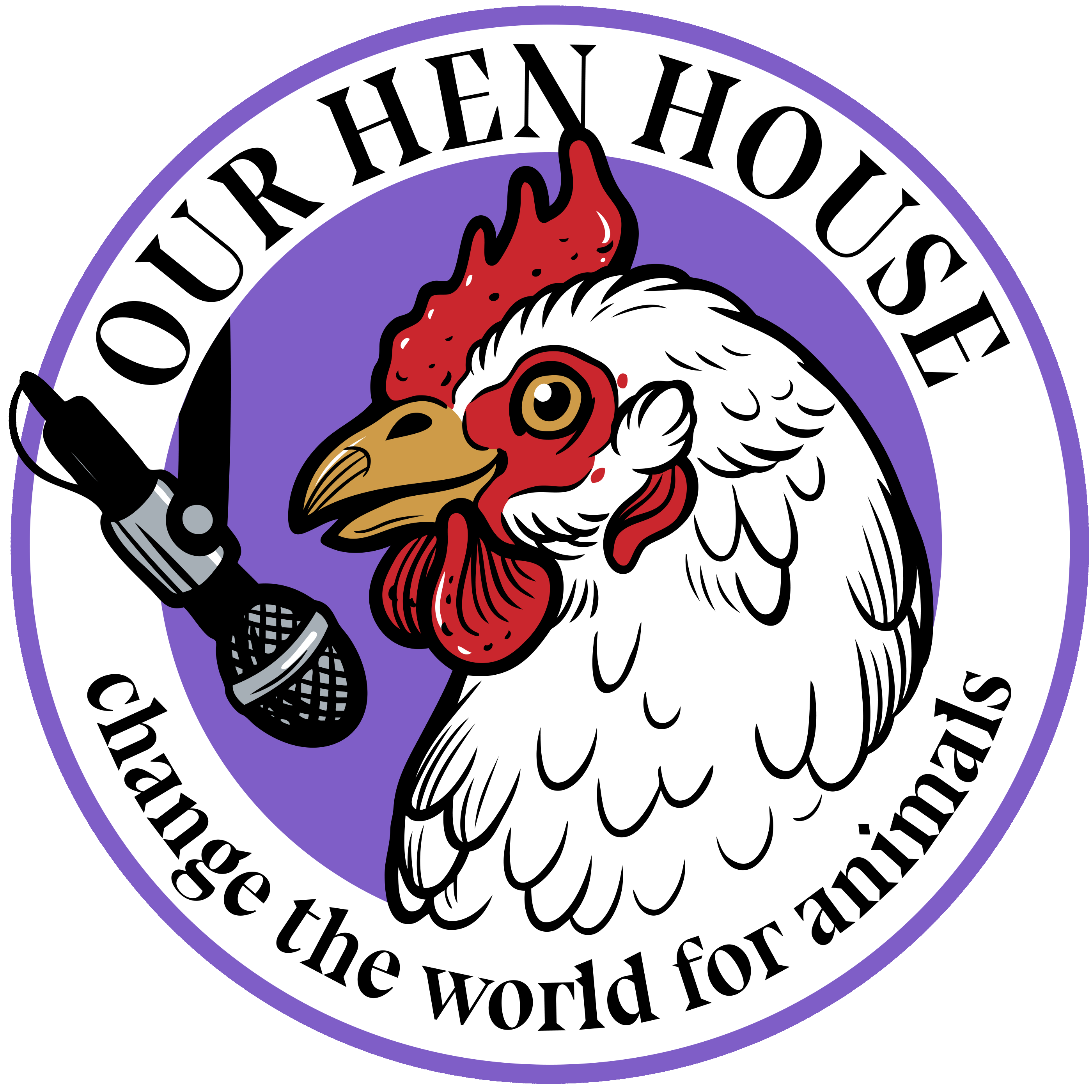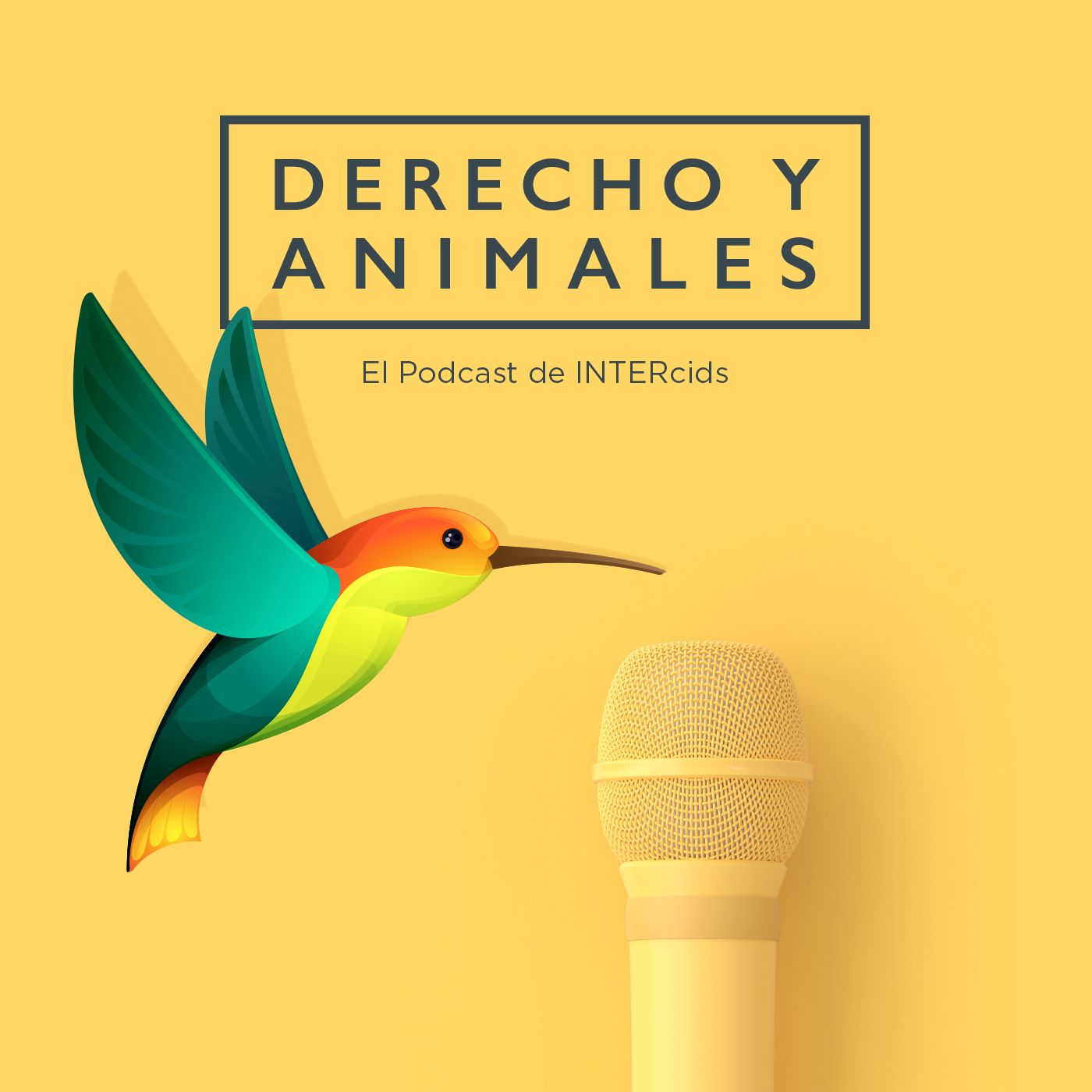
The Animal Turn
Animals are increasingly at the forefront of research questions – Not as shadows to human stories, or as beings we want to understand biologically, or for purely our benefit – but as beings who have histories, stories, and geographies of their own. Each season is set around themes with each episode unpacking a particular animal turn concept and its significance therein. Join Claudia Hirtenfelder as she delves into some of the most important ideas emerging out of this recent turn in scholarship, thinking, and being.
The Animal Turn
Bonus: Sentientism with Jamie Woodhouse
In this bonus episode Claudia talks to Jamie Woodhouse about his podcast Sentientism. Most of the episode is concerned with sentientism as a concept and they talk about some of the tensions and opportunities guests on Jamie’s show have flagged.
Date Recorded: 26 September 2022
Jamie Woodhouse is working to develop Sentientism (“evidence, reason and compassion for all sentient beings”) as a worldview and as a global movement. He hosts the Sentientism Podcast and YouTube and has published articles and presented academic seminars on the Sentientism philosophy and its implications. He is building a range of global Sentientism Communities (open to all) that so far span over 100 countries. You can find him on Twitter @JamieWoodhouse and @Sentientism. Full links here.
Claudia (Towne) Hirtenfelder is the founder and host of The Animal Turn. She is a PhD Candidate in Geography and Planning at Queen’s University and is currently undertaking her own research project looking at the geographical and historical relationships between animals (specifically cows) and cities. She was awarded the AASA Award for Popular Communication for her work on the podcast. Contact Claudia via email (info@theanimalturnpodcast.com) or follow her on Twitter (@ClaudiaFTowne).
Featured:
The Mere Considerability of Animals by Mylan Engel Jr; A Rational Approach to Animal Rights: Extensions in Abolitionist Theory by Corey Wrenn; Animal Liberation and Atheism by Kim Socha; Sentientist Politics by Alasdair Cochrane
The Animal Turn is part of the iROAR, an Animals Podcasting Network and can also be found on A.P.P.L.E, Twitter, and Instagram
Thank you to Animals in Philosophy,
A.P.P.L.EAnimals in Politics, Law, and Ethics researches how we live in interspecies societies and polities.
Disclaimer: This post contains affiliate links. If you make a purchase, I may receive a commission at no extra cost to you.
The Animal Turn is hosted and produced by Claudia Hirtenfelder and is part of the iROAR Network. Learn more on our website.
- Leave a Review on Podchaser
- Check out The Animal Turn Merch.
- Support us on Patreon, Buy Me a Coffee, and Buzzsprout.
00:00 – Introduction
02:43 - Welcome
- Know each other
- First podcast review and Sentientism an interesting one because it sits at some interesting intersections
04:42 - How did you come to start the podcast?
- Long path – had some insights into animal exploitation as a child but too decades for that to manifest into anything
- Had interests in ethics and epistemology
- Grew up as a Church of English Christiaan, “I by default believed that stuff but it never really had a strong impact on our lives”
- Started thinking about religion and became an atheist because of some of the ethical problems with religion
- Led to an exploration of humanism which is a secular naturalistic stance that uses a scientific understanding of the world, but has a universal human compassion (we don’t need a deity)
- But through his sister’s vegetarianism came to see how humanism is very anthropocentric – it had a limited moral scope.
- Philosophy was opening a questioning of moral scope. That’s what led me to picking up the concept of sentientism
09:56 - So sentientism helps to bring the conversation across a divide of humanism and animal related interests?
- A well-founded ethics is not sufficient
- And a well-founded epistemology is not sufficient (epistemology – how we know what we know; ontology – what exists)
- How do we know what we know is such an incredibly important question
- Sentientism has squeezed around the edges but become a more central focus in his projects.
- Persuade 7.9 million people to become sentientism
- Create content around the idea and thinking through the implication in terms of individuals, policies, and institutions – which the podcast contributes to
- Also engages in outreach, talking to people in different fields such as policy makers, advocates, etc so that “pressure test” the sentientism idea.
- Building community, all online communities based around social media platforms “where people come together whether or not they agree with the ideas of sentientism” and engage with those ideas.
- There is no formal organisation or governance, it is just a worldview.
- Website launched 3 years ago, and the podcast been going for 18 months.
- 128 episodes in
- Recently on Knowing Animals and on Our Hen House.
17:02 - What is sentientism?
- Jamie: “I describe it in a sentence as a commitment to using evidence and reason and having compassion for all sentient beings”
- What is real and how should we go about understanding reality. Sentientism suggests using evidence and reason with humility to understand what is real. Let’s try to honestly engage with reality, that’s the naturalistic part
- The other part is that we should have moral consideration for all other sentient beings. “Center of ethics has to be on whether and how we have a concern or others and that concern for others or me means that we value their own existence and their own experiences” Why should there be any suffering or flourishing that we should exclude from our consideration
- A pluralistic and simplistic baseline
- These could be considered controversial questions and considerations
20:15 - Could this just be another boundary drawing activity?
- We need to think about who we are including and excluding
- When you are saying that we are drawing a line of including sentientism, who or what are you excluding?
- Sentientism is a neutral concept and we can be open minded about what is included or excluded
- My concern is about excluding sentient beings, not so much about including non-sentient beings in moral consideration
- There are some risks there, you see this with people who have a biocentric or an ecocentric worldview. This can undermine the stance of beings who can suffer.
- People can quickly cull wild animals in defence of a habitat which is something I would want to challenge
- Sentientism doesn’t say which beings are sentient and it doesn’t insist on a particular philosophy of mind but sentientism wants you to use a naturalistic approach to try and figure it out.
- Sentientism doesn’t insist that we take a perfectly egalitarian consideration of
- “Sentientism is just kind of neutral on all of that stuff. It just says whatever sentientism is, wherever it is it matters. It is the morally salient thing we should be focusing on”
- If you are willing to needless harm or kill it means you have zero compassion, It is trying to include that moral baseline.
25:38 - Other isms – Sentientism is radical
- Feminism, Marxism, … ethical stance and way of thinking
- Feminists are not all the same but there are a variety different ways of wanting to achieve the goal of equality.
- Maybe you are a bit more radical, suggesting to not kill is a pretty radical idea when you consider how much others are hurt abandon
- “You are nudging and knocking at the door of people’s taken for granted views,” Claudia
- It is an interesting juxtaposition, just because sentientism is neutral on many points it doesn’t mean that it isn’t saying anything. “It is deeply radical,” Jamie
- It reiterates all of those things you find in feminist and anti-racist ethics that recognise universal human value and it extends that.
- It can be neutral and pluralistic and deeply radical.
31:01 - Believing in Evidence and Reason
- Nearly everyone thinks evidence and reason are good but many people believe things that are completely unfounded
- But there is an epistemological failure when it comes to looking at animals. The believe that animal farming is humane is not a failure of compassion, it is a failure of epistemology. You believe something not grounded in evidence
- The implications are deeply radical and that is where the challenges happen. The challenges are much more to do with human psychology and human norms than actually philosophical arguments
- Let’s use a method we are going to help us understand what might be real
- We will never be perfectly right but if we act with huminiluty and remain open to new evidence.
- “It’s more a stance that gives us our best shot,” Jamie
- Provides a framework for a more nuanced way of thinking
33:06 - Universal Applications
- “In a way I am unashamedly universal about it”; “I think it can have universal application”
- Some risks with thinking about universals but because the platform is so basic and pluralistic it is actually quiet well grounded. This leaves a whole realm of possibility open
- Turning away from this means wanting to believe in dogmas not grounded in evidence and reason or a decision want
- A broadly define methodological naturalism
- Don’t see any reason why we would exclude any sentient being from moral consideration
- People are nervous when you say science and reason that you are referring to scientists in their lab coats who have done experiments, and they tell us what is right and wrong
- Scientific method produces evidence but different experiences produce evidence too
- “Evidence and reason low through every culture. There are indigenous ways of knowing that are founded in evidence and reason
- Naturalism does have a lot of wonder and awe
- Scientific worldview can come across as dogmatic and that is not how the scientific method and naturalism works, it should have humility
40:18 - Imagine a scenario
- Could imagine a scenario in which dairy farmers say that they love their cows and they say it is compassionate to milk their cows. You could imagine them calling themselves sentientists because they are using compassion, reason and evidence.
- Anyone can claim they have a particular worldview but you have to engage with how beliefs are based on evidence and reason. Is the individual engaging in good faith and a genuine compassion for the others involved.
- Compassion and tensions around how compassion is understood and what we think is achievable
- Tricky because open mindedness is important to developing compassion
44:45 - Open mindedness and Compassion
- In some areas of academia there is so much open-mindedness that they maybe lose any ethical grounding because there is a fear to have a stance
- Overgeneralising can lead to losing the nuance and specificity about animals.
- When we talk about nature we lose sight of animals and the distinct ways they are impacted
- “I would want more context,” Claudia
- “I think we just deserve to give more attention there about they experience the world,” Claudia
48:13 - ‘Challenges’ guests have identified about sentientism
- Questioning if there is an essence with the concept and where the boundaries are drawn, even though sentientism doesn’t draw these lines
- More a question of what we do next because sentientism is too broad, it doesn’t tell us what approaches to use. “There is so much unanswered, it’s really just trying to set that baseline,” Jamie
- People who want to have a supernatural view about the world
- People who argue for an anthropocentric worldview
- People who are worried that a sentio-centric stance is too strict about excluding the biosphere and ecosphere
- Early use of sentientism was criticizing people focusing on sentience instead of the biosphere
- Plants always comes up and there are interesting questions coming up there
- Two ways to look at this, one way that they are significant versus another saying that the=y are sentient
- Existing evidence suggests that their anatomy doesn’t set them up for sentient experience
- Need to think through our taxonomies
- “The thing I would say is that while we focus on these edge cases….they are important things to dig into…but they cannot become a distraction to us for the central core obvious case,” Jamie
- We have overwhelming evidence about mammals, fishes, reptiles and birds are sentient beings
56:11 - The podcast and why its useful for animal studies scholars
- Episodes average about once a week
- Guests include academics, activists, business guests, actors, and public intellectuals
- For animal studies scholars it is important to be explicit about a naturalistic epistemology, many problems come from broken epistemologies so we need to refocus on it.
- It is useful to have a pluralistic approach when it comes from ethics, let’s not forget that moral scope.
- Remind ourselves what moral consideration and compassion mean. The paper about “mere considerability” is excellent.
01:00:35 - The Quote
- Quote from an article Jamie is writing
- “So it strikes me that all human caused problems come down to either a failure of compassion or a failure of epistemology. Either we don’t care or we’ve just got something wrong. Or often both. Those failures can be within individual minds, in social norms, or in institutional policies. So people in groups with accurate beliefs can still do terrible harms if they exclude others from their compassion and compassionate people or groups can do terrible harms if they are wrong about reality. There is no perfect fox to these problems but maybe we could at least agree a starting point, a minimal, pluralistic, baseline worldview with just two tenets: first the best way to understand reality is to engage honestly with it, second that the best safeguard against needlessly causing suffering is to include all those who are capable of experiencing suffering in our moral scope. Neither of these tenets is sufficient by itself, we need both, in short a commitment to evidence, reason, and compassion for all sentient beings” – Jamie Woodhouse
01:02:19 - Connect with Jamie and Learn more
- Find out more by listening to his podcast, connecting on Facebook on Twitter
- Trying to do more writing
- Working on making clearer descriptions about what sentientism be – like what would a universal sentients rights look like or if the sustainable development goals were concerned with sentientism what would that look like?
- What would a sentientist politics or economic look like? Trying to build out these dimensions on the website.
- www.sentientism.info is the website and @sentientism on Twitter





















